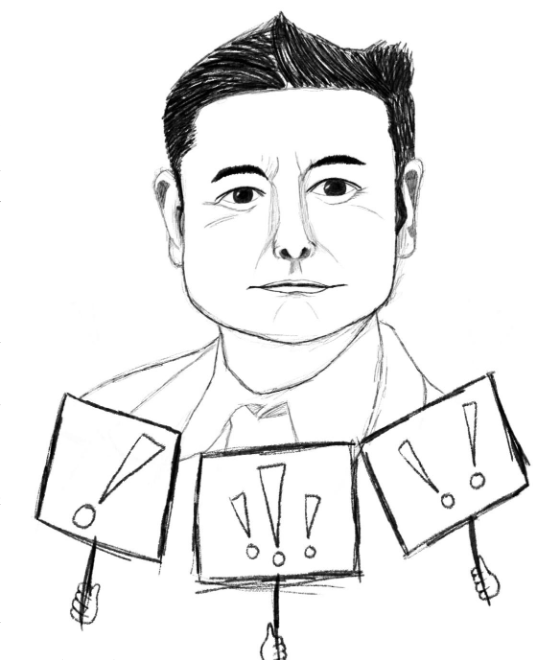Elon Musk’s Twitter could become marketplace of harmful ideas
November 11, 2022
I’m sure by now we’ve all heard the news. Everyone’s favorite app for sharing intrusive thoughts, controversial opinions and funny jokes has been bought by a more controversial figure, Elon Musk. Though this decision seems inconsequential, it has big implications on the ways in which people interact with one another on the app, which could lead to big problems.
Elon Musk currently holds the title of “world’s richest man,” which is both impressive and scary. By scary, I mean with that much money comes power, which is not necessarily something someone like Musk should have.
Musk joined Twitter in 2010, and he had a vastly different presence on the platform than he does now. From tweeting about his meals or a funny joke, Musk’s tweets did not stand out. He also didn’t have the cult-like following he has today. In 2010, Tesla wasn’t very well known or successful – at that point, Musk was just a smart guy trying to make a name for himself.
Now, Musk has a net worth of $223.2 billion and over 100 million dedicated followers on Twitter. And though he is undoubtedly successful, he hasn’t been the best at avoiding conflict. He came under fire in 2020 over statements concerning COVID-19, saying that individuals concerned about the virus were “dumb.” He has also faced criticism regarding sexist statements and jokes, often pointed at specific female figures in the public eye.
His recent drive to buy and run Twitter has controversial roots as well. Musk disagreed with the company’s decision to ban individuals such as former president Donald Trump, in fear of the platform being a “digital town square” that restricts free speech.
Though I am no advocate of the restriction of free speech, I do believe that there should be social consequences to hateful speech from people with social and/or political platforms with large followings and social media platforms. Twitter’s decision to ban certain individuals stems from predictable and seemingly uncontrollable streams of harmful rhetoric that don’t reflect the company’s values rather than a way to prevent free speech.
One key example of this is the banning of conspiracy theorist Alex Jones from the platform. After the Sandy Hook school shooting took the lives of 20 children and six teachers in 2012, Jones began to spread lies regarding the tragedy, convincing his followers that the event was a conspiracy concocted by leftists in order to obtain gun control legislation. As a result, Jones’ supporters harassed the families and put them in danger. Multiple parents of victims filed lawsuits against Jones, which resulted in him paying nearly $1 billion in defamation charges.
Though the victims of Jones’s rhetoric got some justice, Jones still continues to spread misinformation about Sandy Hook and other events and phenomena, making him a potentially dangerous figure. Many other problematic figures in the media do this same thing, making it even more important for them to be held responsible for their speech and actions.
For me, this is the most troubling aspect of Musk’s control over Twitter. It changes the power dynamic from many individuals out of the public eye to one, extremely powerful person very much in the realm of popular culture and modern media. Having a person to “monitor” over harmful posts and speech who is a potential friend, ally or acquaintance with other potential perpetrators could be extremely dangerous and leave marginalized groups or downtrodden individuals damaged by the wrath of hate speech with little-to-no consequences.
Musk recently sealed the deal with Twitter for the price of $44 billion, and it is likely that he will allow previously banned accounts to rejoin the Twitter realm. Though Musk likely won’t do much to prevent hate speech on his platform, it’s important to think critically about socially, politically and economically powerful individuals and what they post. Holding the most powerful sector of the population accountable for their actions might be the only way to protect the people who need protection most.



























































































































































